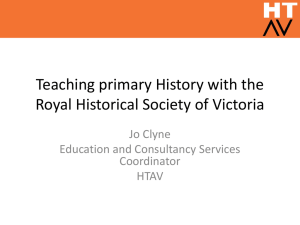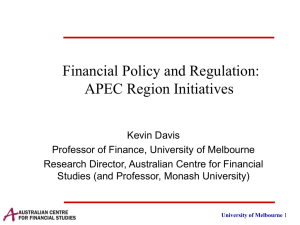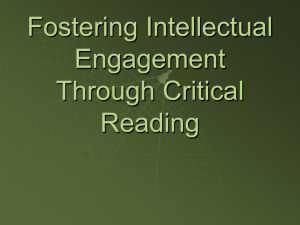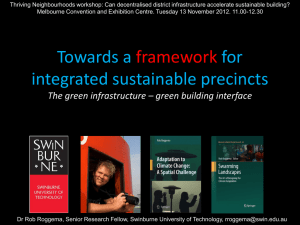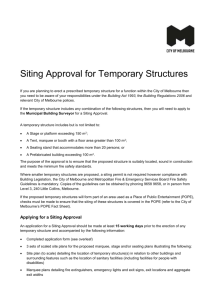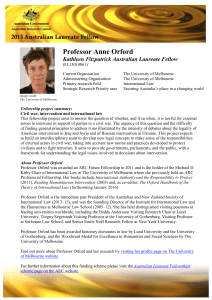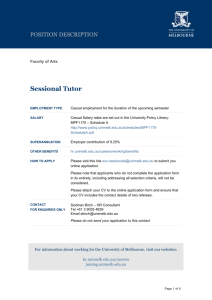Graduation address - University of Melbourne
advertisement
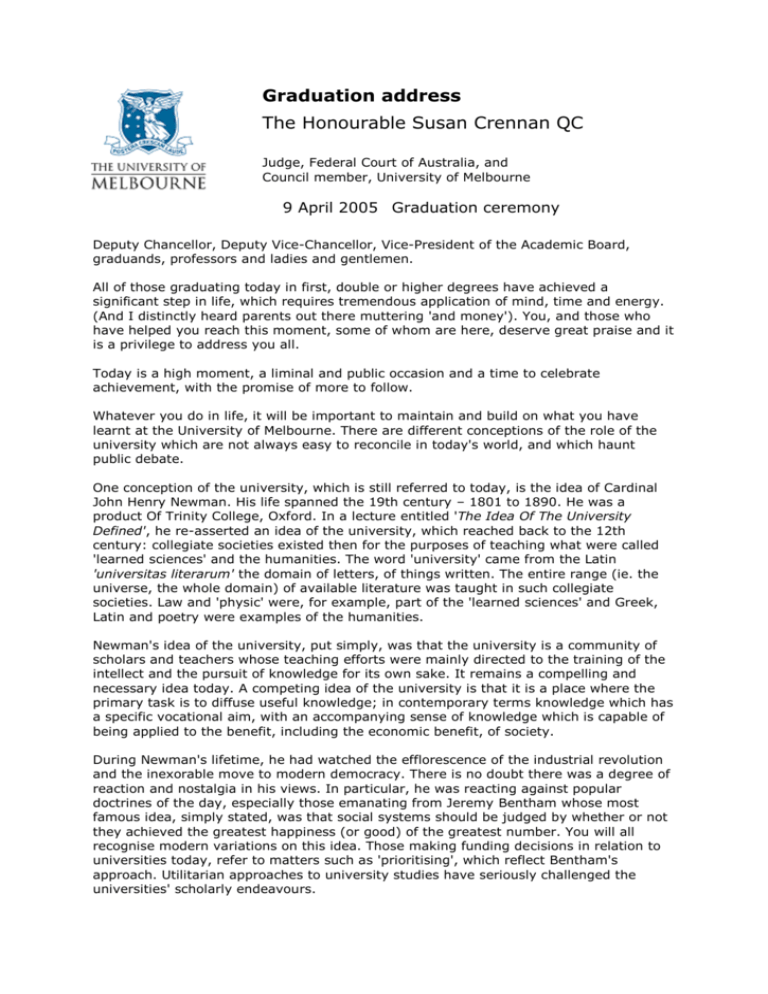
Graduation address The Honourable Susan Crennan QC Judge, Federal Court of Australia, and Council member, University of Melbourne 9 April 2005 Graduation ceremony Deputy Chancellor, Deputy Vice-Chancellor, Vice-President of the Academic Board, graduands, professors and ladies and gentlemen. All of those graduating today in first, double or higher degrees have achieved a significant step in life, which requires tremendous application of mind, time and energy. (And I distinctly heard parents out there muttering 'and money'). You, and those who have helped you reach this moment, some of whom are here, deserve great praise and it is a privilege to address you all. Today is a high moment, a liminal and public occasion and a time to celebrate achievement, with the promise of more to follow. Whatever you do in life, it will be important to maintain and build on what you have learnt at the University of Melbourne. There are different conceptions of the role of the university which are not always easy to reconcile in today's world, and which haunt public debate. One conception of the university, which is still referred to today, is the idea of Cardinal John Henry Newman. His life spanned the 19th century – 1801 to 1890. He was a product Of Trinity College, Oxford. In a lecture entitled 'The Idea Of The University Defined', he re-asserted an idea of the university, which reached back to the 12th century: collegiate societies existed then for the purposes of teaching what were called 'learned sciences' and the humanities. The word 'university' came from the Latin 'universitas literarum' the domain of letters, of things written. The entire range (ie. the universe, the whole domain) of available literature was taught in such collegiate societies. Law and 'physic' were, for example, part of the 'learned sciences' and Greek, Latin and poetry were examples of the humanities. Newman's idea of the university, put simply, was that the university is a community of scholars and teachers whose teaching efforts were mainly directed to the training of the intellect and the pursuit of knowledge for its own sake. It remains a compelling and necessary idea today. A competing idea of the university is that it is a place where the primary task is to diffuse useful knowledge; in contemporary terms knowledge which has a specific vocational aim, with an accompanying sense of knowledge which is capable of being applied to the benefit, including the economic benefit, of society. During Newman's lifetime, he had watched the efflorescence of the industrial revolution and the inexorable move to modern democracy. There is no doubt there was a degree of reaction and nostalgia in his views. In particular, he was reacting against popular doctrines of the day, especially those emanating from Jeremy Bentham whose most famous idea, simply stated, was that social systems should be judged by whether or not they achieved the greatest happiness (or good) of the greatest number. You will all recognise modern variations on this idea. Those making funding decisions in relation to universities today, refer to matters such as 'prioritising', which reflect Bentham's approach. Utilitarian approaches to university studies have seriously challenged the universities' scholarly endeavours. Justice Susan Crennan Graduation address Forgive a brief personal aside. A subject I enjoyed studying at this University some decades ago was Anglo-Saxon. It was quintessentially a subject studied for its own sake and it was never particularly popular. It is inconceivable that today it would be on anyone's list of subjects justifying funding and yet, in fact, it has occasionally proved quite useful in my working life for reasons that were never obvious to me or possibly to my teachers when I studied it. All knowledge can be useful. Every piece of knowledge can count - and to repeat an aphorism of Chief Justice Spigelman's, Chief Justice of the Supreme Court of New South Wales, 'not everything that counts can be counted.' 1 The reality today, however, is that no institution of any size or significance, such as the University of Melbourne, can be run without proper financial management and complete financial accountability and any disinterested pursuit of knowledge has to recognise and deal with that framework. The University of Melbourne is still expected to, and does work within the scholarly paradigm, which Newman sought to reinvigorate in utilitarian times. But, it must do so as it simultaneously accommodates a paradigm resuscitated and reworked in the 21st century, the market paradigm. All sorts of commercial anxieties intrude upon the University's dissemination of knowledge. Is the University sufficiently 'competitive'? How healthy is its 'bottom line'? And so on. The growth of universities and the finite nature of public funding to run them has meant that the idea of a university today, and most probably tomorrow, must include features which would surprise Newman. Students need financial support and arrangements have to be made to make sure there is fair and equal access to high quality teaching for deserving students. The pressure on the university to operate like a business has become, quite quickly, a pressure to operate as a business. Some would say something once called 'the pursuit of truth' has somehow been lost in the process. Contemporary students of this University who have in fact 'pursued truth' in the sense of pursuing knowledge through learning, may have all come to different and seemingly incompatible conclusions at the end of their degrees. Those whose intellectual efforts have been devoted to the sciences and related endeavours know that empiricism is always and ever a perfectly useful way of discovering facts or certain truths. Those here today who have studied the law will know that over a long time, forensic techniques have been developed to try to establish, for example, at least beyond reasonable doubt, whether an accused person standing in the dock did in truth commit a murder in the past. This legal standard for establishing a truth about the past is not an absolute one. Those of you who have studied the liberal arts such as History and English will be well aware that the idea that 'objective truth' even exists is seriously debated; for some it is a 'fiction' from more innocent times because it is asserted, all truth is linguistically and culturally determined. Where does this leave each of you? As Seamus Heaney said in his inaugural address as Professor of Poetry at Oxford University some time ago: '...Nothing is simple; and the deconstructionist critics with their unmaskings and destabilisings, are prolonging by other means the political and intellectual wars that have marked modern times...' 2 as you set out on your working lives, as many of you are about to do, it is worth noting that all intellectual challenges to received ideas of the kind, indeed all new social, political or literary critiques, even if flawed, are somehow oxygen to the world of ideas and reinvigorate a healthy intellectual life. There is always plenty to distract a person from a healthy intellectual life. Reality television is undeniably very popular. I noticed recently Dr Samuel Johnson has an explanation in a letter he wrote on 20 June 1771. He said '...It is certainly true of intellectual nature, that it abhors a vacuum: our minds cannot be empty.' Although our minds cannot be empty they can be full of emptiness, a miserable J.J. Spigelman ‘The Idea of a University’ address delivered at the University of Sydney, 12 October 2002. Seamus Heaney, ‘The Redress of Poetry: an inaugural lecture delivered before the University of Oxford on 24 October 1989’, Oxford, Clarendon, 1990. 1 2 University of Melbourne www.unimelb.edu.au/speeches/ Page 2 of 3 Justice Susan Crennan Graduation address fate from which a variety of gifts, your talents and your education at this University should rescue you. Take from your education at the University of Melbourne an ability to love ideas for their own sake. Creativity expresses ideas in word, pigment or pixels and education, habits of reflection and powers of analysis allow exchanges of ideas without strife. Intellectual combat of a constructive kind is necessary to all the subtle accommodations in life, which facilitate and maintain our institutions, especially good government and the rule of law. Your exposure at this University to contemporary culture, to contemporary science and technology, indeed to the best of knowledge of both the scholarly and the useful kind should equip you to deal competently and happily with a world of changing certitudes and conditions. Your challenges will include all the complex social and political problems common in a pluralist and sophisticated society, indeed world. Those who see a future as philosophers, poets, jurisprudential scholars, musicians or reformers need to give us our bearings. Those of you who will become public administrators must puzzle over the sharing of the benefits of an affluent society and the management of resources. Doctors and scientific researchers will be challenged by a wider world wanting the benefits of medical advances and other technology. There will be room for co-operation between disciplines for this; intellectual property lawyers and international lawyers can assist. Lawyers generally in practice and in the academy will need to work out an effective system of international criminal justice in a world characterised recently by transnational terrorism and given the heightened consciousness of human rights, exemplified in the coming European constitution. The Australian ideal of an egalitarian society, which was the backdrop to both the Victorian constitutions of the mid 19th century and the Federal Constitution, has not always been perfectly achieved but it is a dynamic ideal. To make sure you make your individual contributions to a just, egalitarian yet complex society, and to achieve balance and personal happiness for yourself and those close to you, remember always there is a value in learning for its own sake and not everything of value is a commodity. Truth may or may not be relative but there is no mistaking its opposite – falsity, lies, misrepresentation. Human nature endlessly recovers from the circumstances it inherits. Each new generation comes forward – creative, pragmatic, protean, quotidian – to conquer the benumbing platitudes, prejudices and political correctness of the day – to remake anima mundi, the 'soul of the world' and reshape the vitalities of the universe, for a new dispensation. This happens in every field of human endeavour. And it is now your turn. You are poised to become whatever your mature life has in store, and equipped by your education to resist all that is minatory and false in our present culture and to create your own space in the world. Make it as intellectually rigorous, as creative and as illuminating as you can. Thinking honestly, and as well as you are able, about both your public and your private life, and being open to new ideas, new science, new technology, new art, new music, new directions, yet rigorous in evaluating them, will give you the sort of future the Deputy Chancellor envisaged and which I wish each graduand. One where equanimity, confidence, fairness and the light of intellect reflect the high promise and joy of your graduation today. University of Melbourne www.unimelb.edu.au/speeches/ Page 3 of 3


